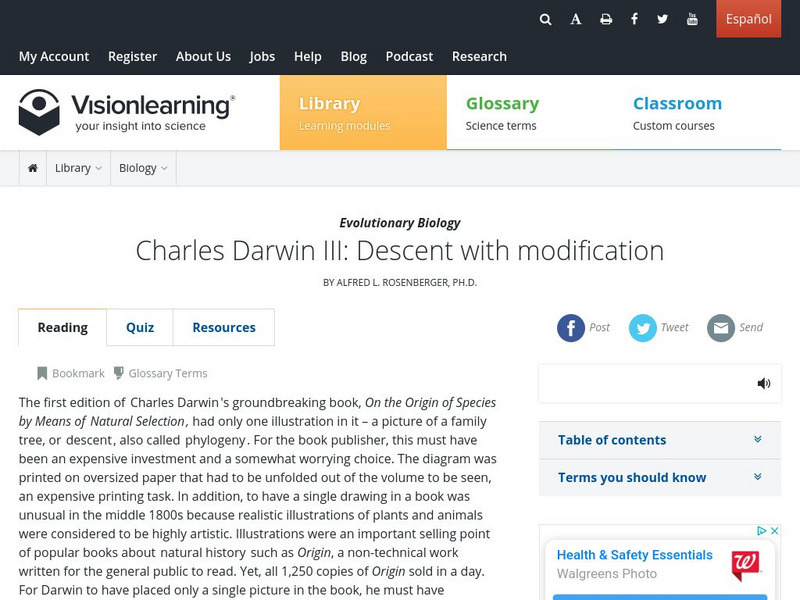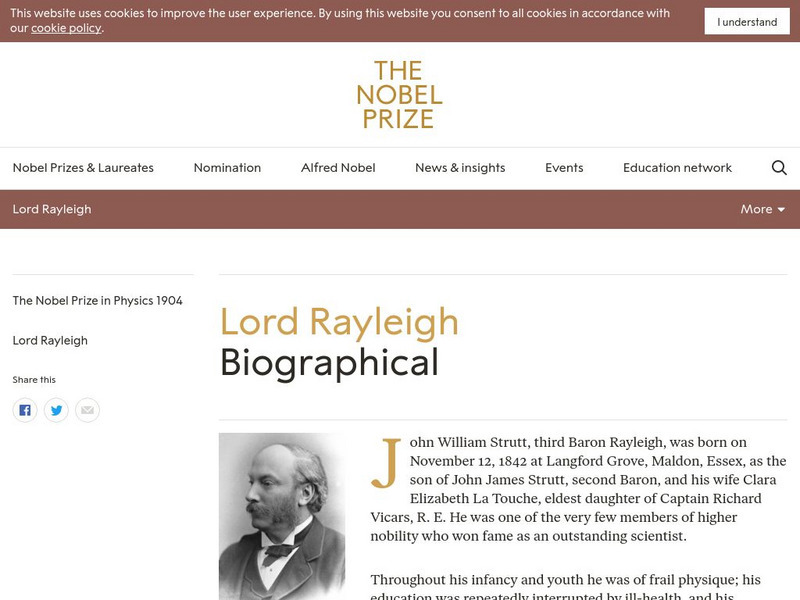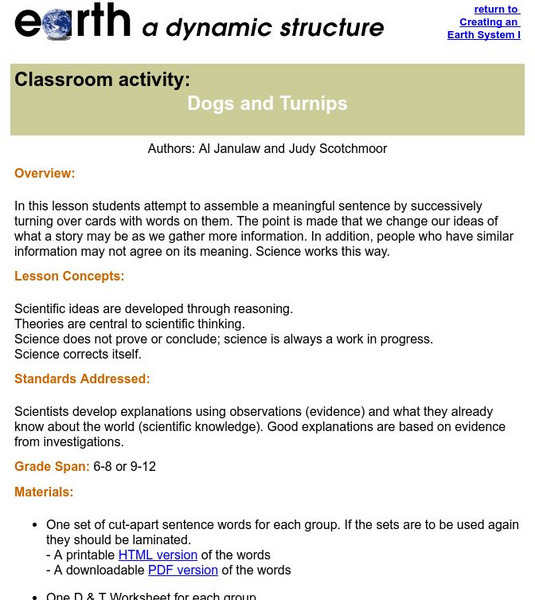Other
Blackwell Publishing: Evolution: Adaptive Explanation
These pages are part of a site called Evolution that accompany a textbook by the same name. Mark Ridley is the author. There is a large amount of information available about adaptations and their role in evolution.
Nobel Media AB
The Nobel Prize: J. J. Thomson Biographical
Read this detailed Nobel E-Museum biography which includes information on the scientific world of Joseph John Thomson, which gained world-wide recognition and earned Thomson the Nobel Prize in Physics.
Vision Learning
Visionlearning: Biology: Charles Darwin Iii: Descent With Modification
Instructional module focusing on Charles Darwin's theory of Descent with Modification. Discusses how slight changes from parent to offspring create variation and potentially create new species over time. Site also includes an interactive...
Open Curriculum
Open Curriculum: Evidence for Evolution
With this article, students will be able to clarify the significance of a scientific theory and recognize that Darwin supported his theory with a great deal of evidence, and that many kinds of evidence since his time have further...
Other
Univ. Of California Riverside: What Is Occham's Razor?
This tutorial explores what Occham's Razor is and how this philosophical adage can be applied to scientific theories and hypotheses.
University of California
Understanding Evolution: An Introduction to Evolution
A textbook definition along with an explanation of the scientific theory of evolution.
Columbia University
Columbia University: Columbia University & Slavery Post 1865: Faculty and Admin
After the Civil War concluded in 1865 and the Thirteenth Amendment abolished slavery, Columbia University's faculty members shaped historical interpretations of slavery, the Civil War, and Reconstruction, as well as scientific theories...
PBS
Pbs: A Science Odyssey
Website for the PBS series "A Science Odyssey." Numerous opportunities to explore the people and discoveries of science.
Texas A&M University
Peer Curricula: Story Time: Thomas H. Huxley
A biography of the remarkable life of Thomas Huxley, who began his life in abject poverty, but through self-education and dedication, became a star in world science.
Wikimedia
Wikipedia: Albert Einstein
In this Spanish-language entry, grasp a concrete understanding of a complicated man whose discoveries impacted society more than any other scientist. This site chronicles the life and accomplishments of Albert Einstein. It also studies...
Nobel Media AB
The Nobel Prize: Lord Rayleigh Biographical
At this site from the Nobel e-Museum, you can read about the scientific work of Lord Rayleigh (1842-1919 CE). This article includes information on his education and experiments with light and sound waves.
NASA
Nasa: Space Place: What Is Science?
Students learn abut scientific investigation and the difference between hypotheses and theories.
Other
American Institute of Physics: Ideas of Cosmology: Big Bang or Steady State?
Find out about the Steady State Theory of the origin of the universe. Learn about the scientific thinking and historical findings supporting this theory which states that new matter is continuously being created.
Louisiana Department of Education
Louisiana Doe: Louisiana Believes: English Language Arts: Grade 5: The Making of a Scientist
Fifth graders learn about the steps of scientific investigation. Students explore how various theories have changed over time by gaining knowledge through scientific investigation. They will begin to use evidence and read about peoples'...
University of California
Ucmp: Understanding Science: Dogs and Turnips
A simple lesson where each group of students turns over word cards creating sentences from them. As the student turns over more cards, the group modifies the meaning of the sentence, leading them to discuss how scientists change their...
PBS
Pbs Teachers: Neanderthals on Trial
Learn about Neanderthals, understand the scientific methods used to create theories from fragmentary evidence and interpret a Neanderthal artifact found at a cave site in Slovenia.
Other
Csicop: Field Guide to Critical Thinking
This article, originally published in Skeptical Inquirer, outlines some of the key components of the scientific problem-solving process while addressing the many reasons for the popularity of paranormal beliefs in the U.S. (Published in...
Other
Isaac Newton
A page at the Isaac Newton (1642-1727 CE) Institute for the Mathematical Sciences website. This page, the contents of which come from the Microsoft Encarta encyclopedia, describes the upbringing, the education, the scientific and...
University of Maryland
Optics Highlights: Optics, Electromagnetic Waves, Quanta
Part of an anecdotal history on optics and the study of light. Extremely thorough treatment of the scientific evidence which led scientists to believe in the particle nature of light. Includes a short biographical sketch and discusses...
Lumen Learning
Lumen: Boundless Biology: The Science of Biology
Explore the concept of scientific reasoning, and compare and contrast hypothesis and theories while understanding the difference between deductive and inductive thinking.
National High Magnetic Field Laboratory
Magnet Academy: Julian Schwinger
Theoretical physicist Julian Schwinger used the mathematical process of renormalization to rid the quantum field theory developed by Paul Dirac of serious incongruities with experimental observations that had nearly prompted the...
TED Talks
Ted: Ted Ed: Can You Solve This?
In this video, Veritasium asks people to try and figure out the rules of a pattern presented. This video teaches us about the scientific method and how our preconceived notions can affect how we discover new information. [4:43]
National Health Museum
Access Excellence: Louis Pasteur (1822 1895)
This Access Excellence site provides information on the scientific achievements of Louis Pasteur, one of "the greatest benefactors of humanity."
CPALMS
Florida State University Cpalms: Florida Students: Evolution: Examining the Evidence
Strengthen understanding of how different types of scientific evidence support the theory of evolution, including direct observation, fossils, DNA, biogeography, and comparative anatomy and embryology.





















